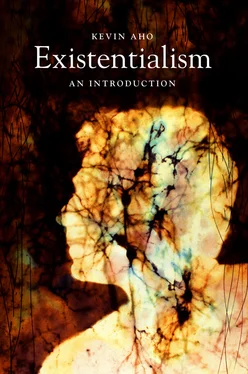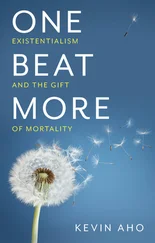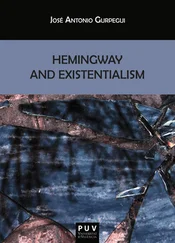Moreover, if it is true that we have the capacity to ‘lead a life’ by making evaluative choices and enacting self-interpretations that are significant or important to us, we have to recognize that these self-interpretations often conflict with our hardened tendency to conform to the everyday norms and expectations of the public. Rather than taking a stand on our situation and fashioning our own story, we all too often drift along with the crowd, living the life story that ‘they’ live. In this sense, as Heidegger says, “We take pleasure and enjoy ourselves as they take pleasure. We read, see, and judge about literature and art as they see and judge; likewise we shrink back from the ‘great mass’ as they shrink back; we find ‘shocking’ what they find shocking. The ‘they’ … prescribes the kind of being of everydayness” (1962, 164). This means in our everyday dealings, we are usually not self-creating individuals but herd animals, alienated from who we are and what matters to us. For this reason, any account of narrative self-constitution must be reconciled with our inveterate tendency of conforming to ‘the they.’
Conformism and self-deception
In his polemical essay ‘The Present Age,’ Kierkegaard captures the struggle that human beings face in creating themselves. To transcend or take a stand on one's own situation is difficult because we are already caught up in the comforting and stable norms of ‘the public.’ We are told what to do, what to believe in, and what to value, and this unburdens us from having to make our own self-defining commitments. We simply let others choose our lives for us. “No single person who belongs to the public makes a real commitment,” says Kierkegaard. “More and more individuals, owing to their bloodless indolence, will aspire to be nothing at all. … This indolent mass … understands nothing and does nothing itself” (1946b, 266–267). Drifting along with the ‘indolent mass’ creates the impression that I am living comfortably and well because I am doing what everyone else does, but this, of course, stifles the possibility of transcendence, of genuinely coming to grips with what really matters in my own life.
In The Death of Ivan Ilych , Tolstoy introduces a character that lives a life of shallow conformism. Ilych is the ‘everyman,’ a superficial society creature who does everything as ‘they’ do it. His decisions to pursue a particular career as a judge, to propose to his wife, to have children, even to furnish his house in the way that he does are all made because his social circle approved. But a life based entirely on the standardized and leveled-down values of ‘the they’ prevents Ilych from realizing who he is as an individual. He is unaware or unwilling to acknowledge his own capacity for transcendence. As a result, he is unable to take a committed stand on anything — a stand that might give his life a sense of focus, direction, and purpose — because nothing really matters to him. He flees from himself and lets the public decide the course of his life. When faced with his untimely death, he is confronted with the terror of not knowing who he is or what he stands for . In his last days, he laments:
‘Then what does it mean? Why? It can't be that life is so senseless and horrible. But if it really has been horrible and senseless, why must I die and die in agony? There is something wrong!’
‘Maybe I did not live as I ought to have done,’ it suddenly occurred to him. ‘But how could that be, when I did everything properly?’ (1960, 148)
Swallowed up by ‘the they’ and unaware of what matters to him as an individual, Tolstoy describes Ilych's life leading up to his death as one that was “most simple and most ordinary and therefore most horrible ” (104).
The self-deceptive shallowness of public life is echoed in Nietzsche, who praises those who have the courage to create their own lives and live independently from ‘the herd.’ For Nietzsche, like Kierkegaard, the public reduces everything to the lowest common denominator and deadens our capacity for healthy and creative self-expression. And this, in turn, prevents us from becoming who we are. He describes this herd-like tendency in Beyond Good and Evil :
Today … it is only the herd animal who is honored and bestows honor. … And so these days, being noble, wanting to be for oneself, managing to be different, standing alone and needing to live independently are integral to the concept of “greatness”; and the philosophy will reveal something of his own idea when he asserts, The greatest person should be the one who can be most lonely, most hidden, most deviant, the man beyond good and evil, the master of his virtues, abundantly rich in will. (1998, 212)
For Nietzsche, those who live ‘beyond good and evil’ have an inborn capacity for self-creation and are naturally equipped to rise above the deadening tyranny of mass culture. This is why he rejects modern democratic values such as equality. The idea that ‘all human beings are created equal’ and have common interests and needs creates a mass ideology that stifles the idiosyncratic strengths and creative tastes unique to the individual. The emergence of modern egalitarianism, then, combined with the forces of mass media, advertising, and entertainment industries, mechanized mass production, and the culture of consumerism, creates what Ortega y Gasset will later call “the mass man,” where each human being “feels just like everybody [else] and nevertheless is not concerned about it; is in fact quite happy to feel itself as one with everybody else” (1932, 15).
Heidegger will develop this theme in Being and Time by suggesting that our absorption in the public world consoles or “tranquilizes” us, creating the comforting illusion that “everything is in the best order” because we are doing what “they” do (1962, 177). Tranquilization prevents us from facing the fact that there is nothing stable that secures or grounds our choices and that our being is always threatened by the possibility of non-being, of death. ‘The they’ conceals this existential threat from us, and as a result it alienates us from who we are. It “provides a constant tranquilization , [an] indifference [that] alienates Dasein from [itself]” (254–255). It is important to note, however, that being a ‘they-self’ is not to be understood as a morally inferior way of being. It is true that Heidegger is critical of our inveterate tendency to fall prey to the conformist fads and fashions of ‘the they,’ but he does not evaluate this negatively. It is, in fact, a positive structure or condition of being human, what Heidegger calls an ‘existentiale’ ( Existentiale ). “The ‘they’ is an existentiale, ” he writes, “and as a primordial phenomenon, it belongs to Dasein's positive constitution” (129). This means existence is necessarily structured by ‘falling’ ( Verfallen ). Insofar as we exist, we ‘fall prey’ to the shared meanings and practices of the world we are thrown into. Given this account, ‘the they’ does not simply represent a source of tranquilized conformism; it is also the source of meaning and intelligibility for our lives. Without ‘the they’ we could not make sense of who we are or why things matter to us in the ways that they do. It is “the ‘they’ itself,” says Heidegger, “[that] articulates the referential context of significance” (129). The upshot is that, in our everyday lives, we are inauthentic, that is, “everyone is the other, and no one is himself” (128). And there is no way for us to completely rise above or extricate ourselves from the tyranny of ‘the they.’ Consequently, Heidegger's view of authenticity, as we will see later, cannot be viewed in terms of a solitary individual or subject who somehow rises above the superficial norms of the public world. Any attempt to free oneself from the crowd and take hold of one's life as an individual requires coming to grips with the publicly interpreted meanings that have already been laid out in advance by ‘the they.’
Читать дальше












